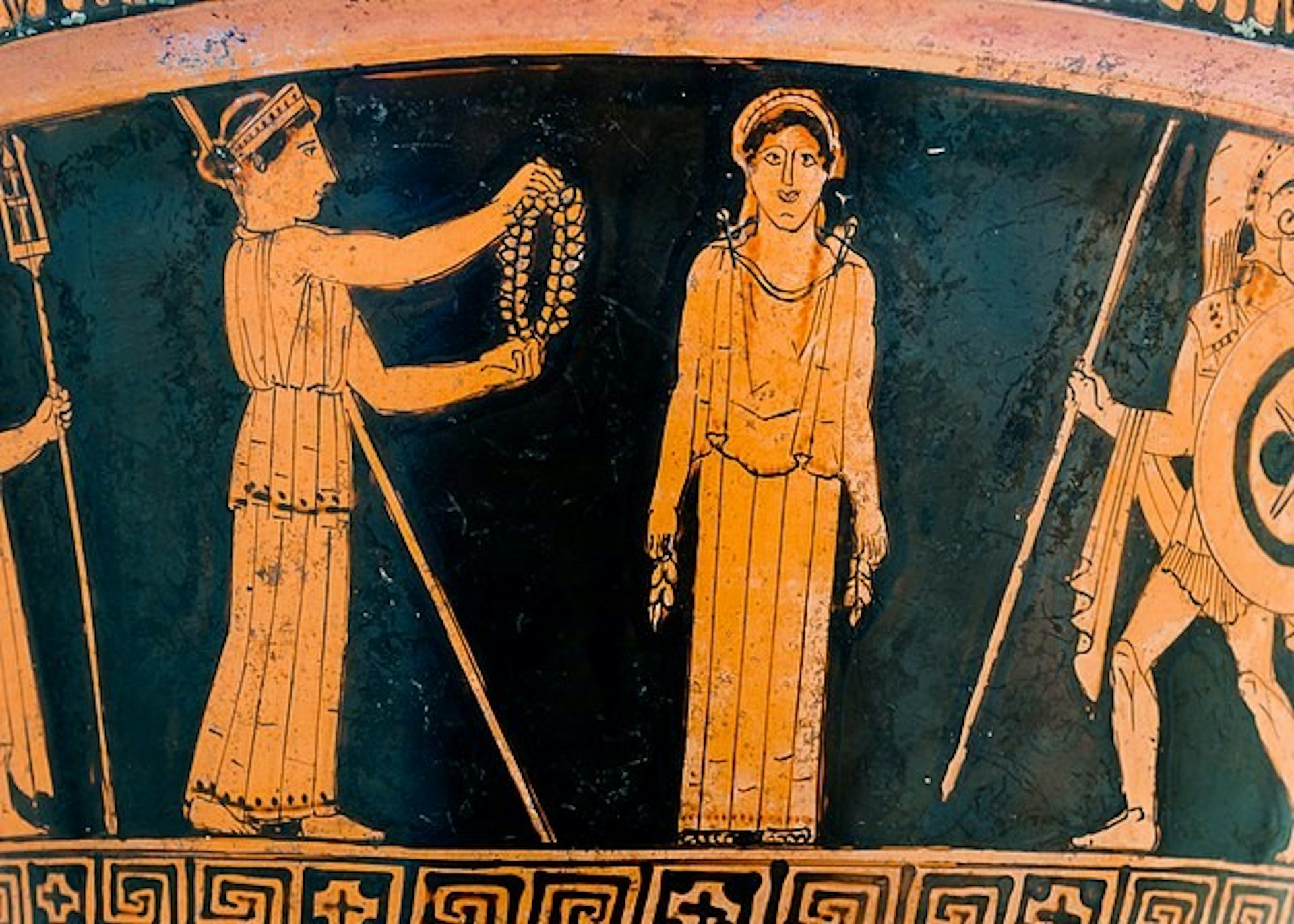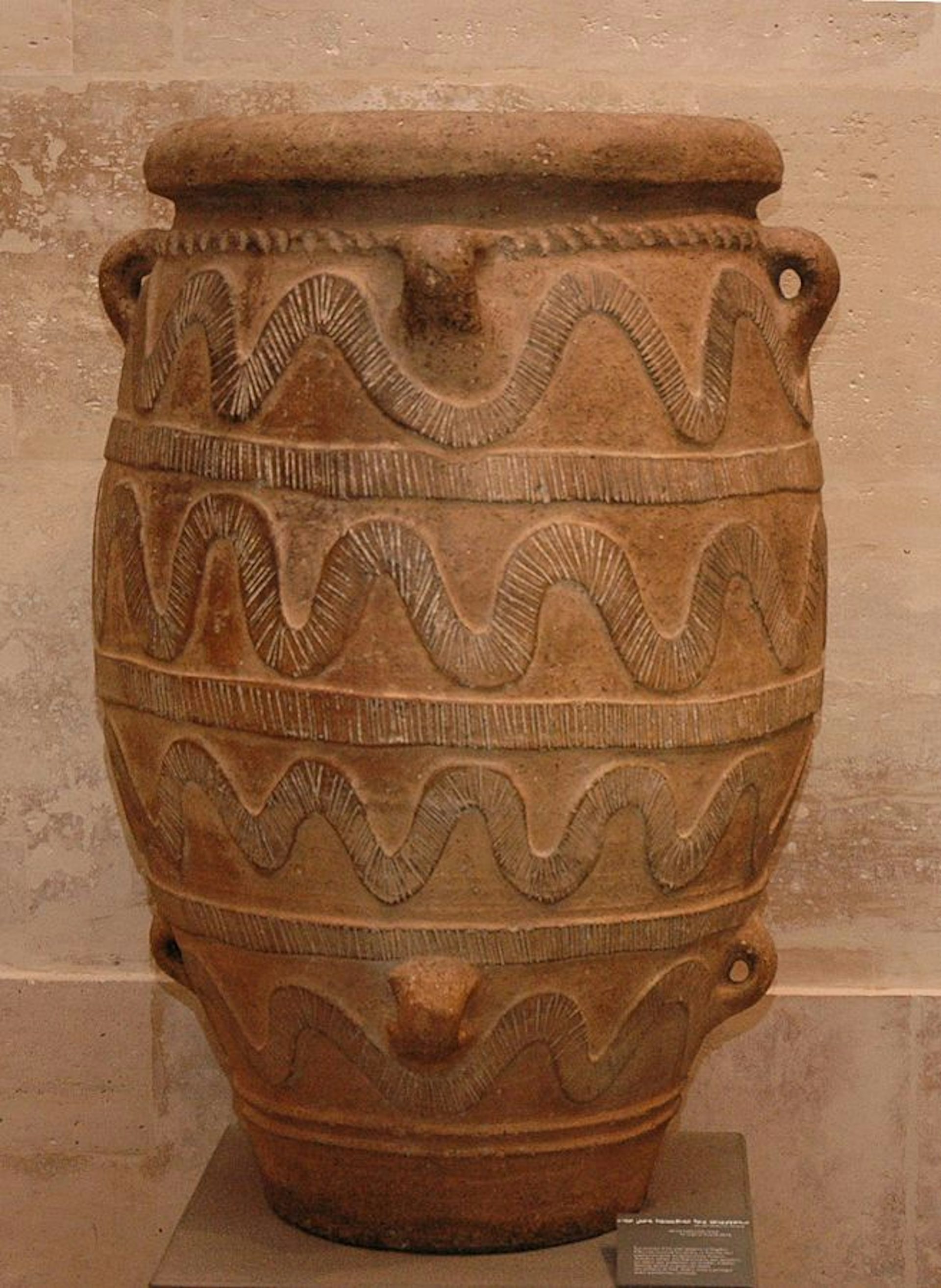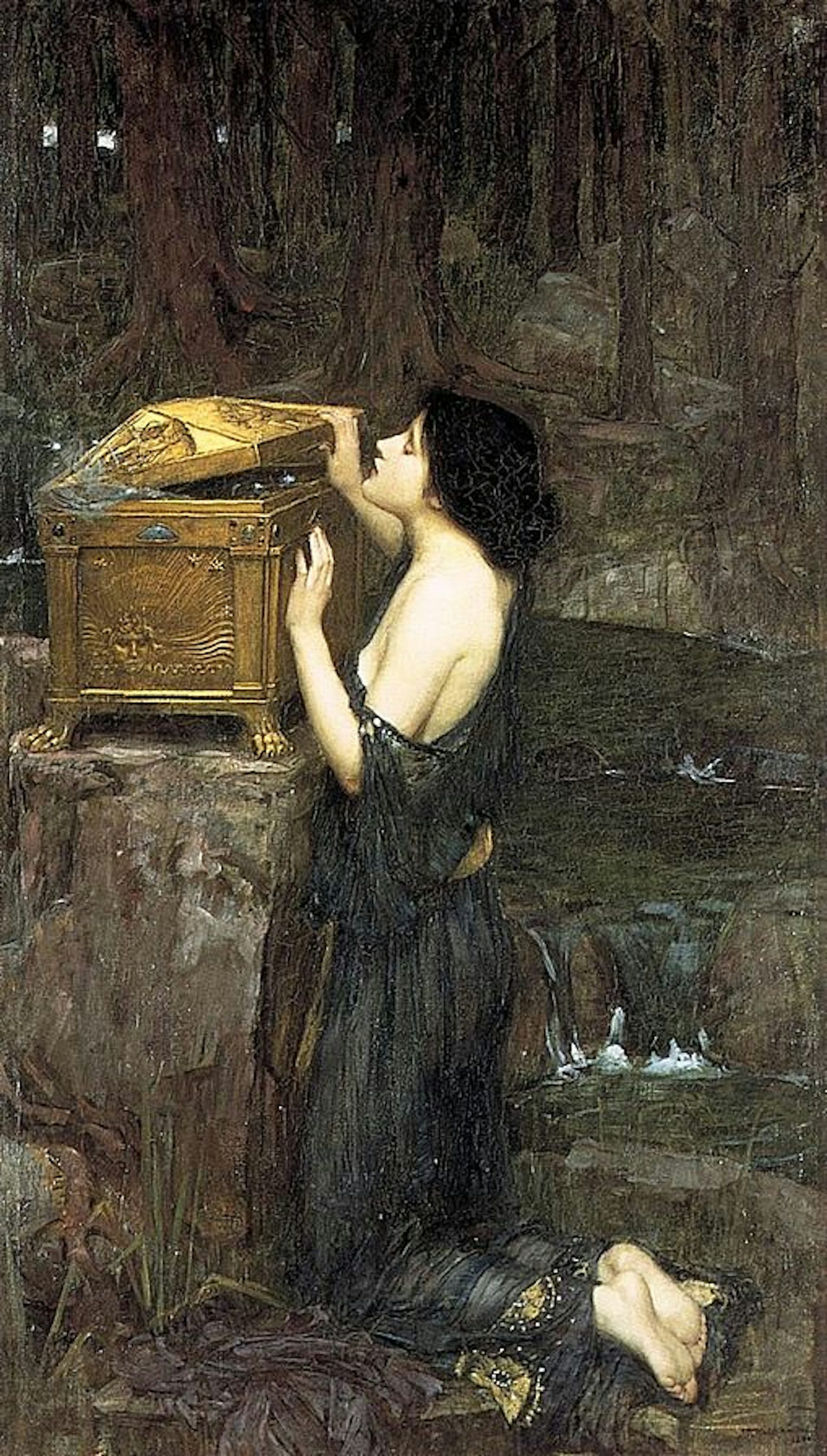Pandora
Overview
Pandora, the first human woman, was fashioned by Hephaestus on instructions from Zeus. She received gifts from all the gods and was presented to Prometheus’ brother Epimetheus as a bride. But Pandora was not a gift: rather, Zeus hoped to use her to punish mortals after Prometheus gave them the fire he had stolen from the gods. As part of this plan, Pandora was entrusted with a lidded jar. When she opened it, she unleashed all the evils of the cosmos upon mankind. Only hope remained in the jar.
Etymology
The name “Pandora” (Greek Πανδώρα, translit. Pandōra) is derived from the Greek words pan, meaning “all,” and dōron, meaning “gift.” The name can thus be translated as “all-gifted” or “all-giving.” According to Hesiod, Pandora received this name because, when she was created, “all they who dwelt on Olympus gave each a gift.”[1]
Pronunciation
English
Greek
Pandora Πανδώρα (translit. Pandōra) Phonetic
IPA
[pan-DAWR-uh, -DOHR-uh] /pænˈdɔr ə, -ˈdoʊr ə/
Alternate Names
Pandora was sometimes known by the alternate name “Anesidora,” meaning “she who sends up gifts.”[2]
Attributes and Iconography
Pandora, perhaps more than any other figure in Greek mythology, was defined by her attributes. Indeed, her name was interpreted by the ancient Greeks as a reference to the fact that, when she was created, each of the gods gave her a different attribute as a gift. From Hephaestus, Pandora received a lovely shape; from Athena, knowledge of crafts; from Aphrodite, irresistible grace and charm; from Hermes, cunning and deceitfulness; and so on. The epic poet Hesiod gives the most complete account:
[Zeus] bade famous Hephaestus make haste and mix earth with water and to put in it the voice and strength of human kind, and fashion a sweet, lovely maiden-shape, like to the immortal goddesses in face; and Athena to teach her needlework and the weaving of the varied web; and golden Aphrodite to shed grace upon her head and cruel longing and cares that weary the limbs. And he charged Hermes the guide, the Slayer of Argus, to put in her a shameless mind and a deceitful nature. So he ordered. And they obeyed the lord Zeus the son of Cronos. Forthwith the famous Lame God moulded clay in the likeness of a modest maid, as the son of Cronos purposed. And the goddess bright eyed Athena girded and clothed her, and the divine Graces and queenly Persuasion put necklaces of gold upon her, and the rich-haired Hours crowned her head with spring flowers. And Pallas Athena bedecked her form with all manner of finery. Also the Guide, the Slayer of Argus, contrived within her lies and crafty words and a deceitful nature at the will of loud thundering Zeus, and the Herald of the gods put speech in her.[3]
Zeus ordered the creation of Pandora as a punishment for mortals. This first woman was designed to be a “beautiful evil”[4] who would make the lives of mortal men miserable. According to this (highly misogynistic) logic, before Pandora—that is, before women were created—mortal men lived a completely carefree existence, which women somehow ruined.

Calyx-krater showing the creation of Pandora, attributed to the Niobid Painter (ca. 460–450 BCE). British Museum, London.
ArchaiOptixCC BY-SA 4.0In ancient art, Pandora was represented as a beautiful young woman. The myth of her birth was a popular subject, appearing, for instance, on the pedestal of the famous statue of Athena Parthenos in Athens.[5]
Family
Since she was created by the gods, Pandora did not have any parents. She married the Greek Titan Epimetheus and together they had Pyrrha, the first woman to be born rather than created.[6] Pyrrha eventually married her cousin Deucalion, the son of Epimetheus’ brother Prometheus. After surviving a flood that wiped out the rest of the human race, Pyrrha and Deucalion went on to become the ancestors of a new humanity.
Family Tree
Consorts
Husband
Children
Daughter
- Pyrrha
Mythology
Origins and Background
The myth of Pandora begins with the Titan Prometheus. After the creation of humanity, Prometheus entered into an ill-advised battle of wits with Zeus. First, he tricked Zeus into accepting the less desirable parts of an animal as the gods’ share of a sacrificial offering. Then, when Zeus retaliated by taking fire away from human beings, Prometheus stole the fire from the gods so he could give it back.
Zeus punished Prometheus severely. He had the Titan chained to a great cliff; every day, an eagle would swoop down and devour his liver. Since Prometheus was immortal, his liver would grow back, only to be devoured again the following day. Prometheus was thus trapped in an endless cycle of agony.[7]
But since human beings had benefited from Prometheus’ misdeeds, Zeus wanted to punish them too. And so he decided to create Pandora, the first woman, who would unleash all evils upon mankind.
Hesiod’s Pandora: The Beautiful Evil
The most familiar version of the myth comes from Hesiod’s epics, especially the Works and Days but also the Theogony. According to Hesiod, Zeus created Pandora to punish humanity for Prometheus’ theft of fire from the gods. Pandora was formed from clay by Hephaestus and endowed with her numerous skills and attributes by Athena, the Graces, Hermes, Aphrodite, the Horae, and Peitho. She was then given a pithos, a large lidded jar, and sent to be the bride of Prometheus’ brother Epimetheus.

Four-handled pithos discovered in Knossos, Crete. From the Early Minoan II Period (15th century BCE). Louvre Museum, Paris.
JastrowPublic DomainEven though Epimetheus had been warned by Prometheus not to accept any gifts from Zeus, he eagerly took the enchanting Pandora into his home. Soon enough, Pandora opened the ill-fated jar given to her by the gods. From it escaped all the evils of the cosmos—sorrow, toil, disease, and the like—which scattered and ran rampant among mankind, destroying their previously carefree existence. Only hope—elpis in Greek—remained in the jar when the lid was closed.[8]

Pandora by John William Waterhouse (1896).
Wikimedia CommonsPublic DomainOther Versions
Though Hesiod’s account is the best known, there are other versions of the myth of Pandora in which her jar was apparently filled with good things rather than evil ones. Yet the result was much the same: when Pandora opened the jar, all the good things—honesty, restraint, grace, etc.—abandoned mankind, with only hope left over.[9]
Interpretations
The myth of Pandora presents several significant challenges to interpretation.
To begin, the tradition of Pandora as the first woman is difficult to reconcile with other traditions surrounding the creation of mortals—for example, Hesiod’s own myth of the Ages of Man, in which the creatures inhabiting the earth cycled through a Golden, Silver, Bronze, Heroic, and finally Iron Age.[10]
Second, poets such as Hesiod seem to have regarded both Pandora herself (that is, womankind) and her jar of evils as Zeus’ punishment for mortals. Since Pandora, as the first woman, represented a very real and tangible source of suffering for the misogynistic ancient Greeks, her jar seems almost redundant.
Third, it is unclear how to interpret the “hope” that was left behind in Pandora’s jar. The Greek word usually translated as hope—elpis—has a range of meanings that encompass not only our current conception of “hope,” but also “expectation,” “belief,” and “anxiety.” As a result, the fact that hope failed to escape the jar could be read as either positive or negative.
But if hope is understood to be good, why was it put into a jar of evils? And if it is a bad thing, why was it not unleashed upon humanity with the other evils? In either case, the fact that hope remained in Pandora’s jar would seem to indicate that human beings are unable to hope—a rather counterintuitive moral.
Some scholars have argued that in the original version of the myth, Pandora was given a jar of positive feelings and attributes, rather than evil ones. By opening the jar, Pandora caused all good things to abandon humanity; since only hope remained, the only positive quality left to humans was the ability to hope. This version certainly seems to make more sense than Hesiod’s better-known alternative, and it is possible that the inconsistencies in Hesiod’s account represent the clumsy combination of different myths and themes.[11]
Worship
The name “Pandora” was used as a title for ancient Greek earth goddesses such as Gaia and Hecate.[12] How the worship of these goddesses was connected to the myth of Pandora is unknown.
Pop Culture
Pandora and “Pandora’s Box” have been extensively appropriated and misinterpreted by modern pop culture. The myth has come to be understood as an explanation for why human beings must face so many hardships with only hope to sustain them—even though it is unclear whether this is the correct interpretation of the myth.
All the same, Pandora and her jar have been referenced in numerous modern films, television shows, books, and video games. For example, Pandora’s Box plays an important role in the video game franchise God of War. It has also featured in the television series Xena: Warrior Princess and in Rick Riordan’s Percy Jackson and the Olympians novels.